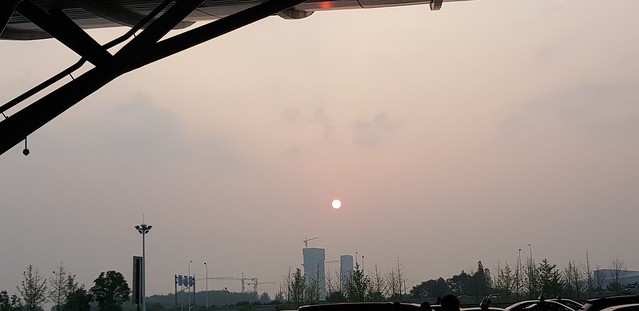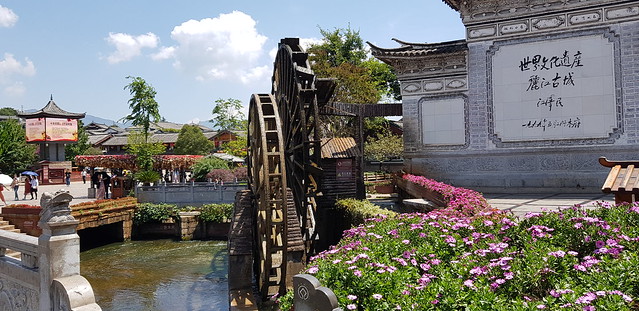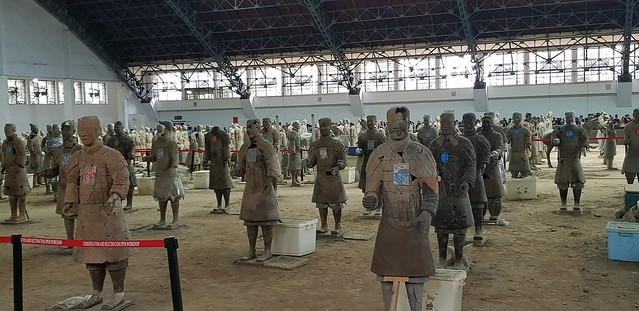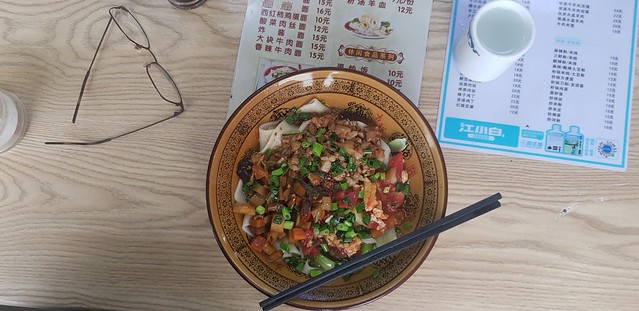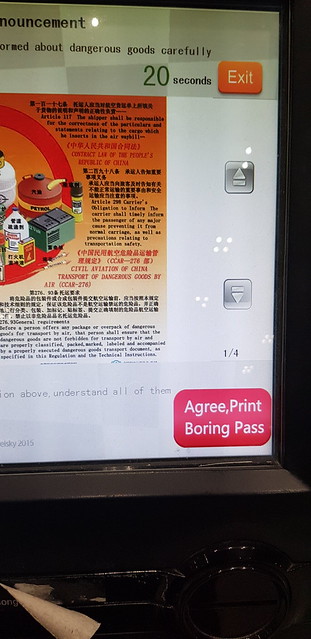Friday, 16 August 2019, approximately 2PM and approximately 2 hours of sleep. Calling that day a somewhat surreal and emotionally taxing day, might, in retrospect, be putting it mildly. I had just spent the night proofreading my graduate thesis for the thousandth time, buried in anxiety that a minor typo in a footnote still buried somewhere on the tenth page of my appendix would destroy my chances of graduation. Within the timespan of barely an hour, I retrieved the print copies of said thesis at a local print shop, handed them in at my university, shared a cup of coffee with some of my classmates—by now, my good friends—at our local coffeehouse hangout, checked my watch, and rushed towards the train-station. I had a flight to China to catch.
Despite the unwarranted stress, my five years as both undergraduate and graduate student at KU Leuven—enrolling at this university must have been the single most transformative decision I have ever taken—were now definitely at an end. To ‘celebrate’, I would now partake in a graduation trip to mainland China, accompanied by some of my closest friends while living in Japan. Both literally and figuratively a graduation trip, this trip was simultaneously a finale to my student life at KU Leuven, to my period of living in Japan, and to my youth in general.
A finale written by a director of slice-of-life situational comedy, that is; while contemplating all the above at the airport, a stoic voice announced that my flight was canceled.
Itinerary
My initial plan was to take the plane to Hong Kong, spend the afternoon hanging out with a friend in Tsim Sha Tsui, and take a late evening train straight to Changsha, my initial destination.
Fortunately, after my initial flight was canceled and making my connection in time seemed increasingly unlikely, I received a new itinerary to Changsha through connecting flights in the Netherlands and Shanghai. I would have to wait approximately seven more hours in the airport of Amsterdam, but I’ve had worse experiences and I could just take a nap after checking in.
Or so I thought.
A couple of hours afterwards I was informed that my flight to Shanghai was canceled. Instead, I was offered a direct flight to Changsha from Frankfurt, Germany the next day as well as a free stay in a nearby hotel. Oh well. Heading towards the exit, I even met some familiar faces. For several weeks during the end of June and early August, I assisted a team of Kyoto University scholars in digitizing Edo-era Ukiyo-e woodblock prints at the Brussels Royal Museum of Arts. Turns out they took a detour in the Netherlands and were heading to the United States from Amsterdam Airport.
Although at the time of boarding it turned out there was some data mismatch with my rescheduled flight, it was, at least, sorted out in time to like, actually let me board. The flight to Changsha was quite pleasant, though, and I even ended up playing a couple of rounds of Xiangqi (“Chinese chess”) with the guy sitting next to me, a Chinese student living in Germany.2
Immigration and passport control was no doubt by the far the most strict I have ever experienced, but generally speaking, there were no further hiccups and,3 after meeting up with friends at the airport our trip was good to go.
Changsha (长沙市)
Calling Changsha, the capital of Hunan (湖南) Province, a tourist-friendly destination is a bit of stretch, and for most foreign tourists, the city and its airport will serve primarily as layover. Changsha downtown in particular has a bit of an industrious, developing atmosphere.
This was particularly obvious when our friend guided us to a local private cinema place; for a handful of yuen per person (the equivalent of about $2), we had access to a room with a large reclining sofa, HD beamer and a large selection of movies, which was quite comfortable where it not for a handful of cockroaches in our vicinity. The building itself had seen better days, and aside from one employee it felt as if we were the only people there.
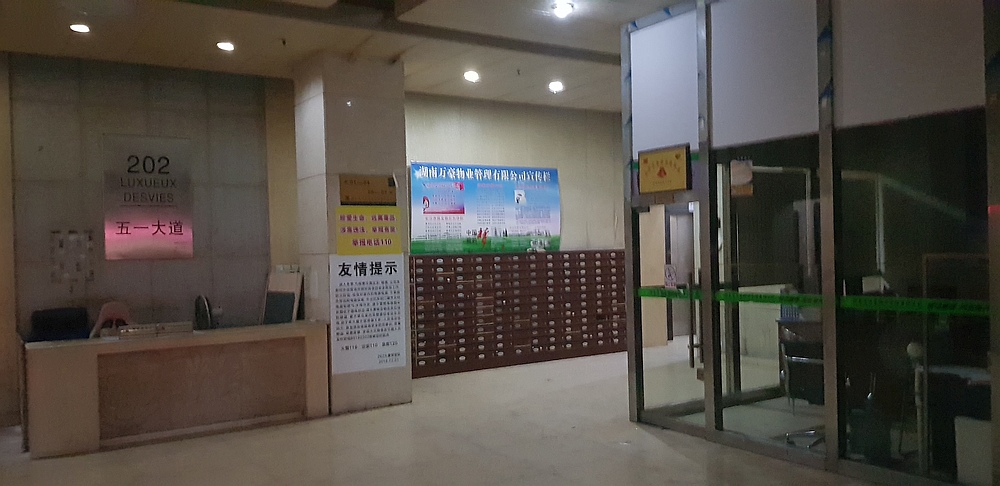
Or when we, deciding on Karaoke, found a nearby place in another worn down building—the guard at the front fast asleep—, took the elevator to one of the top floors and ended up at what appeared to be an intense fight. We heard glass break as soon as the elevator doors opened, and promptly entered a strange scene of drunk, shirtless men shouting and waving billiard cues around, someone hiding behind a counter, and dark smoke rising from the corner. For a second everyone stared at us, most likely wondering what a white, western tourist was doing at 2AM in a downtown karaoke, and we solemnly took that silence as a cue to make our departure.
Such initial impressions aside (that wouldn’t apply to the usual foreign tourist either way), Changsha had its share of vibrant urban life with some lovely, scenic hot spots such as the surroundings of Hunan University (near a massive statue of Mao Zedong—Mao was born in a nearby village),
Having lived in Japan, even in an international metropolis such as Tokyo, I was more accustomed to standing out and being either approached, avoided or stared at due to being foreign-looking. Even then, I was not prepared for how much elevated this would be during my trip and stay in Changsha in particular; I can’t recall how many times I have heard the terms 外国人 (wàiguórén) or 老外 (lǎowài), both more or less meaning foreigner, or was cautiously approached by children wanting to practice what they had learned at their English classes.
Oh - and this counts for other regions in China as well -, I highly recommend looking into local food delivery and uber-style transport services; they are both reliant and cost-effective, and for non-locals a more ideal way of getting around rather than figuring out each local public transport system.
Yunnan (云南省)
Our next destination was Kunming, the capital of Yunnan.
One of the first things that hit on arrival me was the drastic difference in climate compared to Changsha. Although separated only by one province in-between, the temperature in Changsha was at that time of the year unbearably hot to the point we could barely engage in outdoor activities during day-time, whereas the high altitude of Kunming and Yunnan in general provided a very pleasant, temperate climate.
Moreover, despite stereotypes of air pollution in China, the air around Kunming and the other places of Yunnan we visited was surprisingly clean, often with crystal clear blue skies befitting the time of the year.
Kunming (昆明市)
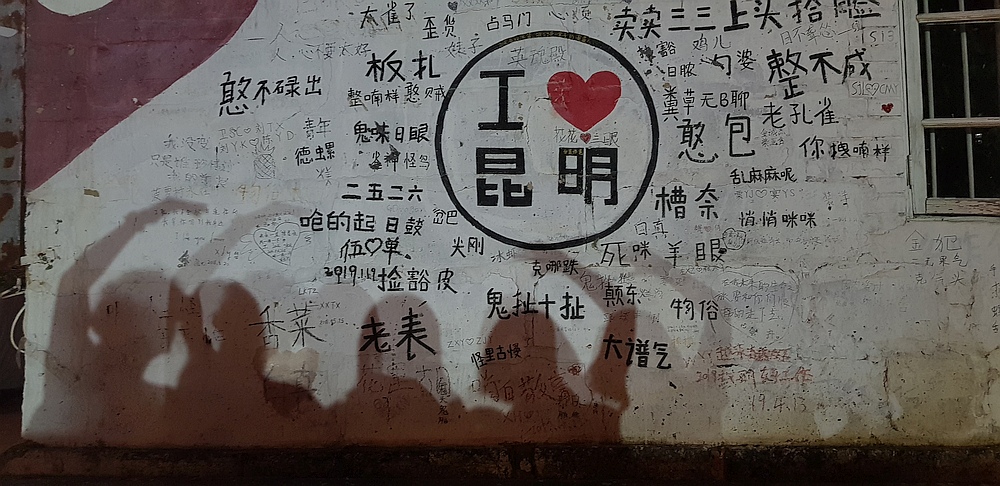
Some of the central areas of Kunming were particularly vibrant, with a lovely youthful vibrant vibe. My friends introduced me to their university, famed for its focus on Chinese ethnic minorities, anthropology and cultural studies, as well as the surrounding parks, the nearby shopping districts Wenhua Alley and Qianju street, Daguan Park and Guandu Old Town.
Because of the lovely weather, the park were filled with people enjoying a walk or performing music. Mahjong tables drew formidable crowds of elderly people commenting on in progress games, and other parts of the park drew rows of people stretching, dancing an exercising.
The spicy dishes recommended to me in Changsha were right up my alley but the food I’ve eaten here was personally at an entirely different level. The mushroom hotpot was by far one of the best things I have ever eaten, and I’m not overreacting when I say I would definitely consider a detour back to Kunming next time I’m in China, purely for the food.
An interesting sight I would’ve liked to capture on photo was the juxtaposition of a young, fashionable girl, taking a selfie in front of a historical Socialist-era statue celebrating the working class, situated right in front of feudal-era Qing dynasty architecture: a fascinating micro-representation of a layered society with clear elements of three distinctly different modes of production.
『向前一小步、文明一大步』 -
Neil ArmstrongFamous Toilet Proverb
On a side note, this plate found around public restrooms was quite comical; translating to something akin to “One small step for man, one giant leap forward towards civilization”, a polite way of asking men to stand closer to the urinals.
Lijiang (丽江市)
Lijiang, the nearby Dali and Shangri-la are historical towns near the border of Sichuan and Tibet, popular among in-land tourists for the natural beauty of its surrounding mountains and the architectural traditions of the various ethnic minorities inhabiting these regions.
Without exaggeration the old town of Lijiang and the hotel I was staying at are among the most beautiful places I have visited in my life. The historical center is particularly lively even in the late evening, with daily bonfires and dancing; but the nearby Black Dragon Pool made for a perfect breathing space. One particular height of our stay was an afternoon of horse riding along the Jade Dragon Snow Mountain.
One thing I must admit is that the high altitude of the region takes a while to get used to and is fairly draining; leaving me absolutely exhausted after a full day out and a long climb up back to the hotel.
Upon arrival at the airport we were informed that our flight would be delayed by about five hours. While several people were noticeably aggravated, others took the news more calmly: one guy took out his jump rope and started exercising in the middle of the hallway. Another guy, a local musician practicing acoustic guitar, upon noticing me walked over and asked me to join him. To be fair, it was clear he was more interested in taking pictures together to post on social media, but it was a nice way of passing and he helped me out afterwards by sharing his 4G hot spot when I needed to make a phone call (passengers would receive a small financial compensation for the delay, which was to be deposited on a personal WePay account, which I as a foreigner did not have).
Because of our late arrival in Xi’an I was unable to leave the airport and find a place to stay so I used part of the financial compensation to rent a small cabin with a couch at the airport instead.
Xi’an, Shaanxi (西安市,陕西省)
Xi’an, the capital of Shaanxi Province, is famed worldwide for its rich history as the historic capital of China for about a millennium of its existence, and for its international importance in the era of the Silk Road. Of particular fame are the Terracotta Warriors, an in-progress excavation site containing an impressive army of around 2,000 incredibly detailed and life-like statues of armed soldiers and horses. The site has become one of China’s major tourist attractions and a main staple of guided tours throughout the country. Aside from a couple of exceptions in Lijiang, it was my first time being confronted with other western tourists.
Biangbiang noodles, a famous regional dish of Shaanxi Province, has some notoriety among learners of Chinese characters due to its highly complex character with 58 strokes, that as of 2019 has not yet been encoded in Unicode. Although none of my Chinese friends actually like Biangbiang noodles, it’s something I’ve been wanting to try for a while, and thus entered one of plenty of local eateries that decorated their storefront with those characters.
The noodles itself were interesting; an appearance I hadn’t encountered before. A highly affordable and decent meal, although I’m not particularly fond of bok choy. More amusing was my communication with the waitress. Because I was by myself at the time and could not understand what she was saying, the waitress started typing something on what I assumed was an automatic translation app on her smartphone. What I was shown, however, was a text editor with the sentences she wrote down in Chinese characters as-is. Based on my limited study of the language and recognition of characters I recognized as a Japanese speaker, we were able to have a short conversation. Still not sure if she thought it normal for western foreigners to read Chinese, or if she just assumed I might have been a foreign student starting out.
My flight back included a final day in Hong Kong. Since I was unable to meet my friend there after a failed first attempt, now would have been a good opportunity. Upon arrival in Hong Kong the afternoon a day ahead of departure, the ongoing Hong Kong protests reached new heights that left either of us unable to meet each other, with clusters of protesting right around the airport. Moreover, my credit card was for an unforeseen reason blocked and I could not withdraw cash from an ATM, leaving me once again stranded in in airport, forced to spend the night there.
At least my flight wasn’t canceled this time, though. ¯\(ツ)_/¯
Music
While traveling, I make a habit out of listening to local radio stations or asking recommendations to people I meet in hostels or bars, as my own form of personal souvenir. This time I have grown particularly fond of folk musician Hongyu Chen (陈鸿宇) and the singer-songwriter Hua Chenyu, whose experimental composition Cancer gives me goosebumps regardless how many times I listen to it.
Conclusion
Not so much a real tourist trip through China as a short and wholesome visit to some people dear to me, I nevertheless thoroughly enjoyed my stay and was glad to experience firsthand some elements of daily life in a nation that is due to various socio-political an economical reasons still highly prone to a wide variety of negative stereotypes and misconceptions abroad. Thanks to my limited knowledge of the Chinese language, as well as the assistance of my Chinese friends, I was generally able to get by quite well as well. Due to a rise in local tourism, accessibility has reportedly increased immensely, but I must admit that for foreign travelers, especially those traveling alone and lacking Chinese language skills, going “off the beaten path” will be quite a challenge and require sufficient planning ahead.
Obviously there are contentious political elements that could be discussed concerning China. This blog post is however not the appropriate space for that; my trip there was intended primarily as a graduation trip in the company of some of my closest friends during my period as exchange student in Japan, and that I, despite the hiccups, enjoyed immensely. I definitely look forward to return for a longer period of time, China is immense with a highly diverse ecosystem, natural beauty and rich history that I would love to further explore, perhaps next time while taking on the role of a more traditional tourist.
Gallery Gallery Changsha | Kunming | Lijiang | Xi’an
-
Lijiang by Stevie Poppe (https://flic.kr/p/2fMA1vY - CC BY-SA 2.0) ↩
-
Or, well, get utterly destroyed, that is. I’ve won the occasional round playing with my friends in Japan, but in hindsight I wonder if they let me win out of pity. ↩
-
By the way, the process of applying for a single entry 30-day tourist visa was surprisingly easy as well, given that you have a local friend able to vouch for you through an invitation letter (there are plenty of templates for that online). I did make the mistake of providing only the front-side of my friend’s passport, which could not be accepted. While trying to submit my application, I couldn’t reach my friend for a new scan, but fortunately another friend saved my skin by skipping class early and providing a complete invitation letter—we communicate in Japanese so that was a bit of a weird phone call in the Chinese embassy, though. ↩

